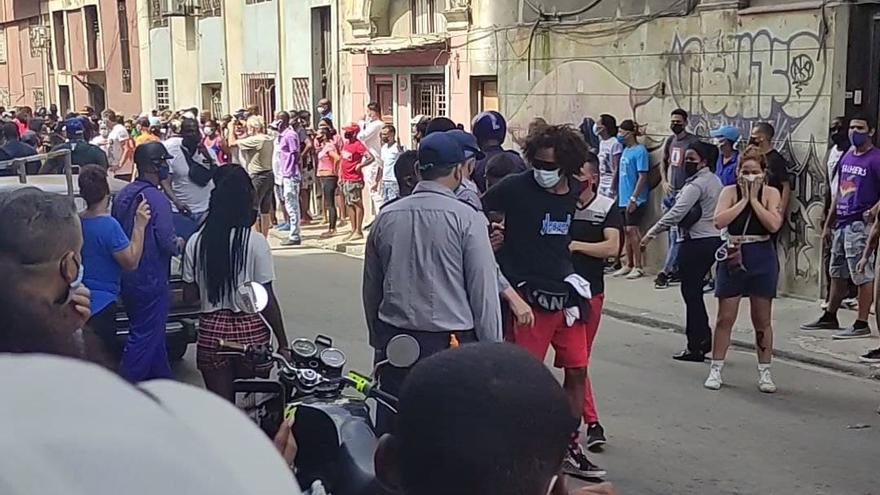
![]() 14ymedio, Yunior Garcia Aguilera, Madrid, 15 November 2023 — The international left sometimes seems less like an ideology and more like a dogma. Many of its organizations and activists are motivated by compacts, debts and interests, not by principles or objectives. The Mothers of Plaza de Mayo, for example, are capable of embracing today’s dictators while turning their backs on other mothers now fighting for justice for their unjustly imprisoned children.
14ymedio, Yunior Garcia Aguilera, Madrid, 15 November 2023 — The international left sometimes seems less like an ideology and more like a dogma. Many of its organizations and activists are motivated by compacts, debts and interests, not by principles or objectives. The Mothers of Plaza de Mayo, for example, are capable of embracing today’s dictators while turning their backs on other mothers now fighting for justice for their unjustly imprisoned children.
The sect had its share of altars, relics and prayers but its aspirations were emptied of their content. Poets and singers lent it their talents with blind fanaticism, paving the road to hell with good intentions.
The fires of that hell burn in countries like Cuba, where no one believes in songs about equality and social justice anymore because reality hits you in the face like a henchman’s boot. We have stopped speaking in the future tense. Our everyday speech now compels us to disguise the future as some uncertain present. No one says, “I will come tomorrow.” Instead, we say, “I come tomorrow.” In Cuba we stopped dreaming a long time ago. Now we escape en masse, heading towards the American dream or the Spanish siesta.
The western world’s oldest dictatorship has acquired extensive experience in influence trading and diplomatic marketing
It is paradoxical and disingenuous in the extreme that a regime as abusive as Cuba’s retains a seat on the United Nations Human Rights Council. One might ask: What is the purpose of an institution whose judges are notorious criminals? What’s the point of putting a jurist’s robe on a known human rights violator?
It’s obvious the system is not working. It has a factory defect. The western world’s oldest dictatorship has acquired extensive experience in influence peddling and diplomatic marketing. They know exactly what screws to tighten to get favorable votes in international institutions. And once the truth becomes plainly evident, they have a loyal left all too willing to betray its ideals and play along with the bloc.
Nothing remains of the old 20th century utopia. Every version of the great revolutionary scam became more dystopian, both in Venezuela and in Nicaragua. Ultimately, it was never about the people, much less the workers. It was about power, plain and simple. The Orwellian prophecy came to fruition in spades, filling the farm with ever more two-legged pigs.
Like every religion, the Latin American left had its own sacred texts. Eduardo Galeano’s The Open Veins of Latin America became the bible of the continent’s progressives. The Uruguayan writer later admitted he had a shaky grasp of economics and politics when he wrote the book. “I wouldn’t be able to read it today,” he admitted in Brasilia in 2014. “That sort of traditional leftist prose can be very heavy-handed.”
I would like to pose my own challenge to Cuba’s state-run press: I dare you to publish the Universal Declaration of Human Rights in your newspapers’ centerspreads, without taglines or manipulative commentary!
It is, in fact, a well-written albeit populist book. It simplified complex issues using seductive language. It appealed more to emotion than to reason. It absolved us of all blame, foisting all our problems and their solutions onto the shoulders of others. Despite this, Galeano continues to be quoted with the same fervor that Jesuits quote St. Ignatius Loyola.
Another poet of the pantheon is Mario Benedetti. In his poem “Everything Is Clear Now” he posed a challenge, calling for a broad internernational compaign for “human lefts.” The writing is unquestionably brilliant. But in countries such as Cuba, where power is cynically ambidextrous, such work is ultimately sterile.
All the dissidents who been persecuted, incarcerated or exiled know this. One young man, Romero Negrín, knew it in his ribs. He once dared to hold up a poster that read, “Socialism yes, repression no.” They beat him to death. Alina Barbara Lopez Hernandez, an intellectual accused of resistance and disobedience, knows it. Everyone who has tried unsuccessfully to form an independent trade union knows it. The teachers who do not get paid on time, whose monthly paychecks are only enough to buy a measly carton of eggs, know it. Doctors who lack what they need to save lives while hotels get everything they want know it.
I would like to pose my own challenge to Cuba’s state-run press: I dare you to publish the Universal Declaration of Human Rights in your newspapers’ centerspreads, without taglines or manipulative commentary. Would their owners permit it? Cuba is the country where the police could once arrest you for covertly distributing this document. Cuba is where the regime’s henchmen shouted “Down with human rights!” during pro-government demonstrations. In Cuba not even the poetic though impotent human lefts are respected.
____________
COLLABORATE WITH OUR WORK: The 14ymedio team is committed to practicing serious journalism that reflects Cuba’s reality in all its depth. Thank you for joining us on this long journey. We invite you to continue supporting us by becoming a member of 14ymedio now. Together we can continue transforming journalism in Cuba.
